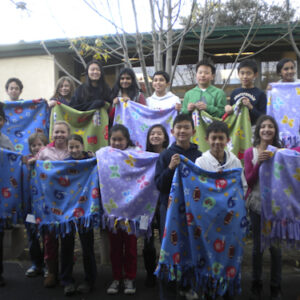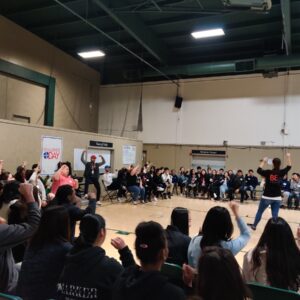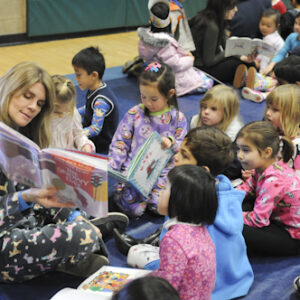This story originally appeared in the spring 2014 Harker Quarterly.
Imagine if children struggling to make sense out of confusing emotions could simply reach into a box and pull out the appropriate tools to help them better navigate social and academic situations. At Harker’s lower school, students are learning to do just that, thanks to an innovative new curriculum called The Toolbox Project.
The award-winning program, involving all students and staff at the Bucknall campus, is designed to empower children with specific tools that will help guide them in managing their own lives – both at school and in the community at large.
“The tools help you when you are mad because you can calm down and work out problems with your friends,” said grade 1 student Maya Baker, an enthusiastic supporter of the project. Giving an example of the “garbage can tool,” she explained that if your mind is too focused on a problem, you can use the tool to simply “throw it away.” On the other hand, she added, being shown the “listening tool” means to start listening to what someone is saying.
“As a teacher, I appreciate that The Toolbox Project provides the children with effective ways to handle a variety of situations. It validates their feelings and gives them a common language to solve problems. Using the tools comes naturally to the students, and they are eager to put them to use!” noted Baker’s teacher, Cindy Proctor.
At the heart of the ongoing program are 12 tools, practiced both in and out of the classroom: breathing, quiet/safe place, listening, empathy, personal space, using our words, garbage can, taking time, please and thank you, apology and forgiveness, patience and courage.
The project was implemented at the lower school at the start of the school year.
The tools were introduced one at a time, as part of a weekly lesson. During each lesson, students were given a picture of an icon representing that week’s tool, which were then cut out and added to the children’s individual cardboard toolboxes.
Toolbox lessons, which continue throughout the year, are taught during character development sessions. These sessions are typically held in the students’ homerooms for K-2, but can take place in other settings for the older students depending on grade level scheduling. They often include role- playing, fun projects, class discussions and references to literary stories. They are also reinforced with home/connection letters and activities.
In the fall about 140 parents enthusiastically attended an informational kickoff presentation about The Toolbox Project. That event was held in the lower school’s gym and hosted by Chuck Fisher, director of programs at Dovetail Learning Inc., which runs the program.
“What impressed me most about Harker was the depth of interest adults had for using these tools in their own self-regulation practices,” Fisher recalled. “As adults, there is nothing more powerful than modeling to children how we use these tools to be the kind of teacher or parent we most want to be.”
The Toolbox Project founder Mark Collin developed the curriculum more than eight years ago when he was working as a school counselor. In his words, “The children were struggling with many personal and family challenges, in addition to the usual struggles of growing up. They had no tools to recognize and name their feelings and deal with them constructively.”
Together he and his students began to identify and tap into their own inner capacities and strengths, promoting natural resilience. Collin used the metaphor of a personal toolbox and the symbols of real tools that translated easily into the idea of inner tools. The children immediately took to it and helped him identify and name the 12 tools, which led to the creation of The Toolbox Project, a nonprofit organization whose name was later changed to Dovetail Learning, with Toolbox as the flagship curriculum program.
According to Sarah Leonard, primary school head, “Implementation of The Toolbox Project has been going quite well. Faculty and staff are fully supportive of the program and have embraced it with enthusiasm and commitment to achieve the desired results.”
Indeed, even at the lower school’s youngest level, The Toolbox Project has been a huge hit. Of his experience using the program, kindergartner Aidan Okyar said, “The patience tool is really good for you. Pretend my dad is using my soccer ball and I want it, I could just use my football instead.”
Okyar added that if he were going to make up his own tool, he would call it the “healthy tool” and it would look like a carrot. He even came up with a saying for his new make-believe tool, which would state: “I will be healthy for my life.”
“I felt that it was incredible that Aidan wanted to expand on the number tools and add more to help us with navigating our lives!” said his teacher, Katherine Chi.
As a further part of the empathy training for the kindergarten students, Troy Townzen ’08, a current member of the school’s BEST staff, helped the youngsters create a special music video to visually illustrate the concept.
“Troy and the kindergarten staff spent endless hours putting it together to help the children understand the meaning of empathy. And I really think it worked! The students are showing more empathy and kindness toward their friends. They’re even singing the chorus (from the video) out on the playground. A true success!” said Kim Cali, director of the lower school’s BEST program.
“These tools have become our common language,” said Leonard, noting that lower school students of all ages have been increasingly peppering their everyday language with references to the tools they have learned.











